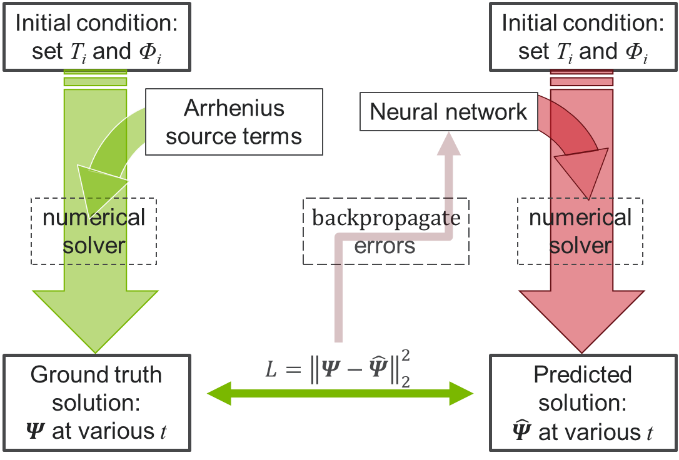Madison, Wisconsin—July 19, 2021—The Computational Multi-Physics Research Section at Argonne National Laboratory was awarded funding through the Department of Energy’s 2021 Technology Commercialization Fund (TCF) for a collaborative project with Convergent Science. The TCF program was created to promote the commercialization of technologies developed at the Department of Energy by strengthening partnerships between industry and the U.S. national laboratories. This is the second TCF project that Argonne and Convergent Science have partnered on that focuses on integrating machine learning and artificial intelligence into the computational fluid dynamics (CFD) simulation process to improve simulation tools for industry.
In 2018, Argonne received TCF funding to work with industry partners Convergent Science and Parallel Works to commercialize a machine learning-driven design optimization technology. The technology, called ML-GA, was developed at Argonne and integrated into the Parallel Works commercial high-performance computing platform. Large-scale simulation-based demonstration studies were performed by the team using CONVERGE to test the capabilities of the technology. Ultimately, ML-GA enabled optimization studies to be completed faster than current state-of-the-art methods, such as design of experiments and genetic algorithms.
In the new TCF project, Argonne and Convergent Science will focus on further developing a deep learning framework, referred to as ChemNODE, to accelerate detailed chemistry CFD simulations for reacting flows. In applications such as gas turbine engines, rotating detonation engines, and advanced internal combustion engines, simulating the combustion process is computationally intensive. To make these simulations practical, engineers typically use skeletal reaction mechanisms, but larger, detailed mechanisms can provide greater levels of predictive accuracy.
“We have completed proof-of-concept studies of ChemNODE for simple fuels like hydrogen and ethylene, which have relatively small mechanisms,” said Dr. Pinaki Pal, a research scientist in the Energy Systems division at Argonne leading both TCF projects. “The goal of this project is to scale up the technology so it can be used with much larger chemical kinetic mechanisms, on the order of hundreds or even thousands of species.”
For these large mechanisms, ChemNODE will be tested on GPUs to significantly accelerate the chemistry calculations and enable realistic engine combustion simulations with unprecedented fidelity. In the future, the ChemNODE technology will be incorporated into the CONVERGE software package.
“At Argonne, we’re focused on delivering impact through discovery science and development of next generation technologies that will help transform society for the better,” said Megan Clifford, Associate Laboratory Director for Science & Technology Partnerships and Outreach (S&TPO) at Argonne National Laboratory. “Working closely with industry partners such as Convergent Science is essential to moving innovations from the laboratory to commercial deployment.”
“Partnering with national laboratories allows us to leverage ‘big science’ tools that we otherwise would not have access to, such as the world-class supercomputers at Argonne,” said Dr. Kelly Senecal, co-owner of Convergent Science. “Together with Argonne, we are developing cutting-edge technologies and bringing them to consumers via enhancements to our CONVERGE CFD software.”

Founded in 1997 in Madison, Wisconsin, Convergent Science is a global leader in computational fluid dynamics (CFD) software. Its customers include leading automotive and commercial vehicle manufacturers, tier one suppliers, and professional motorsport teams.
Its flagship product, CONVERGE, is an innovative CFD software with truly autonomous meshing capabilities that eliminate the grid generation bottleneck from the simulation process. CONVERGE is revolutionizing the CFD industry and shifting the paradigm toward predictive CFD.
For more information about Convergent Science, please visit convergecfd.com.
Contact
Tiffany Cook
Partner & Public Relations Manager
[email protected]
(830) 625-5005
Argonne National Laboratory seeks solutions to pressing national problems in science and technology. The nation’s first national laboratory, Argonne conducts leading-edge basic and applied scientific research in virtually every scientific discipline. Argonne researchers work closely with researchers from hundreds of companies, universities, and federal, state and municipal agencies to help them solve their specific problems, advance America’s scientific leadership and prepare the nation for a better future. With employees from more than 60 nations, Argonne is managed by UChicago Argonne, LLC for the U.S. Department of Energy’s Office of Science.
The U.S. Department of Energy’s Office of Science is the single largest supporter of basic research in the physical sciences in the United States and is working to address some of the most pressing challenges of our time. For more information, visit https://energy.gov/science.